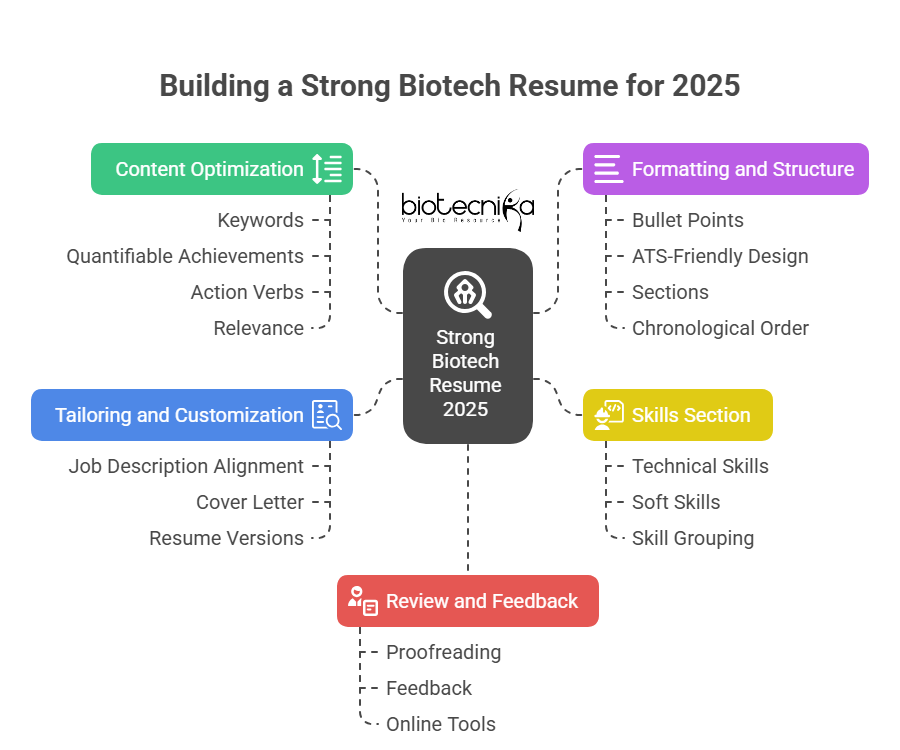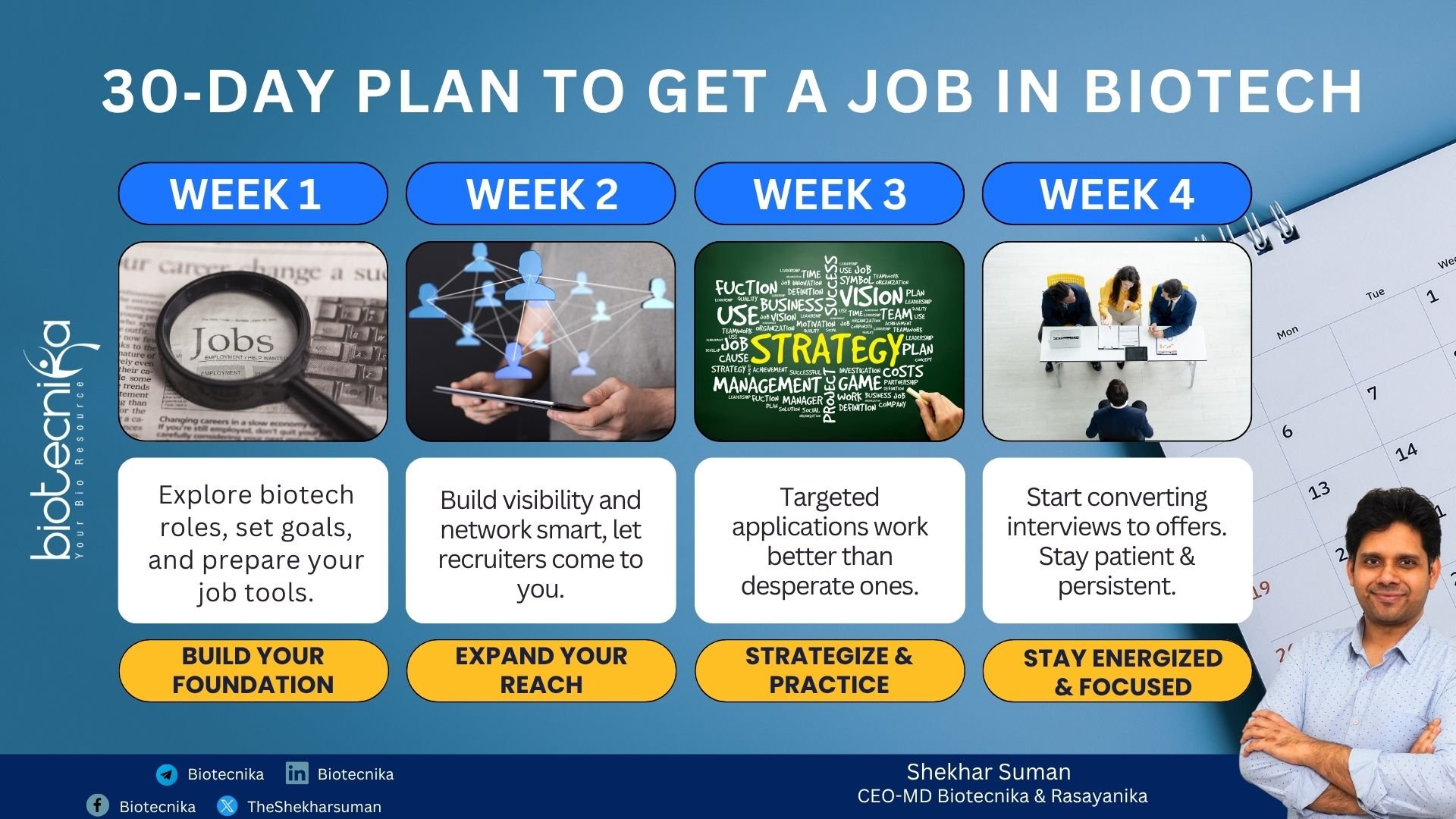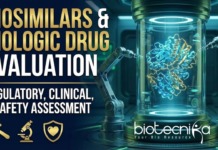Biotech Jobs in 2025: 30‑Day Plan to Get a Job in Biotech
Ping! There it was.
The email Manvi has been refreshing for all week. After months of sending resumes into what felt like a black hole, Manvi finally felt a sense of relief. She finally saw it. The subject line glowing on her screen: “Interview Invitation – Quality Assurance Associate.”
Just two weeks earlier, she was ready to abandon her biotech dream. She had a degree, a thesis project, and even an internship, but every email she sent went unanswered. It feels like all her applications seemed to vanish without a response. Her friends were shifting to IT or generic lab jobs. Her parents were urging her to “take anything.”
As a biotech graduate, she set out to find jobs like a scientific experiment. She built a structured plan. From mapping out companies to reaching out to people, she had a roadmap. This article shows you exactly how to replicate that same 30-day transformation, step by step, to secure biotech jobs in 2025.
Why 2025 Is Still Your Chance to Enter Biotech
The biotech sector remains poised for explosive growth. The global biotech industry’s revenue is expected to nearly double from around USD 1.7 trillion in 2024 to over USD 3.7 trillion by 2034. Meanwhile, the Asia Pacific market, especially India, is forecasted to grow at ~9% annually through 2030.
In India specifically, the bioeconomy has grown from USD 10 billion in 2014 to USD 165 billion by 2024. It is expected to surpass USD 300 billion by 2030. Thanks to the government initiatives like BIO‑E3 and investments in bio-incubators and biotech parks
Even after these trends, the biotech job market remains competitive and cautious in early 2025. Hiring has slowed considerably compared to 2021-22. There were many layoffs this year. Still, there were specific entry-level roles that were consistently in demand, especially in quality, trials, documentation, regulatory compliance, and manufacturing operations.
The industry requires skilled, disciplined, and adaptable individuals who can make a meaningful contribution from day one. This offers you numerous biotech jobs in 2025.
The 30‑Day Plan: Your Weekly Roadmap
Week 1 – Build Your Foundation
The primary goal is to understand the biotech landscape, identify your ideal roles, and collect your job-hunting toolkit.
Days 1–3: Research & Map the Landscape
Don’t apply randomly. First, learn where you would fit best. Target the areas that attract graduate interest and potential hiring opportunities. Some of these areas include Clinical Research, Bioinformatics, Data Science, Regulatory Affairs & Quality, Drug Discovery, Bioprocessing & Biomanufacturing.
- Understand entry‑level roles:
| Role | What You Do | Key Skills |
| QA/Quality Assurance Associate | Audit documentation ensures compliance with SOPs and GMP | QC methods, documentation, and detail orientation |
| Clinical Trials Assistant | Manages trial logistics and data | Data entry, regulatory basics, teamwork |
| Lab Technician | Runs experiments and maintains equipment | PCR, ELISA, cell culture |
| Biomanufacturing Tech | Supports scale‑up production processes | Fermentation, process control, GMP |
| Regulatory Affairs Assistant | Prepares filings and compliance documents | Regulatory rules, precision, and documentation |
Now you have understood the job roles, create a list of companies. To begin with, you can list 30 national and international biotech companies. Companies like Roche, Pfizer, Syngene, and Biocon are actively offering Biotech Jobs in 2025.
You can create a spreadsheet that includes roles, skill requirements, and company links. Make sure your strengths align with these roles.
Days 4–7: Polish Your Resume, Cover Letter & Portfolio
Your resume is not just another document. It’s your first impression on your potential employer. Your resume must clearly articulate your abilities.
Here are some resume tips you should follow to build a strong resume to get Biotech Jobs in 2025.
- Use keywords from the job description.
- Quantify your experiences. For example, highlight the number of samples you have processed.
- Use bullet points. Avoid long paragraphs.
- Keep a clean, ATS-friendly format.
- Don’t use tables or any fancy templates and visuals.
To build an impressive cover letter. You can:
- Start with a template that can be customized easily.
- Personalize each letter.
- Mention how your interests align with the company’s pipeline.
By Day 7, finalize your polished resume, a generic cover letter template, and a list of companies you want to apply to.
Week 2 – Expand Your Reach
In the second week, your goal must be to build visibility and connections. Make recruiters come to you, not the other way around. That’s possible with strong networking. This will help you secure biotech jobs in 2025 more quickly.
Days 8–10: Network Effectively
Many biotech companies hire candidates based on referrals. To secure Biotech Jobs in 2025, you need a strong network.
Where to network?
You can build a network with the help of LinkedIn, where you can join biotech groups, comment on posts, and post your insights. You can follow biotech companies to understand their trends and get notifications of job openings.
Days 11–14: Strengthen Your Digital Presence
Remember, your LinkedIn profile is your second resume. Optimize your LinkedIn profile. Craft a compelling headline in the About section, focusing on your passion, tools, and how you aim to contribute.
Add technical and soft skills to your LinkedIn profile. To extend your online credibility, you can request 2-3 recommendations from your mentors and professors. Post at least once a week.
By the end of week 2, your profile should highlight technical competence and attract recruiter attention within seconds.
How to begin conversations?
When sending a connection request via LinkedIn, include a brief note. Once you have connected with people on LinkedIn, start building a meaningful conversation.
Don’t directly ask for a referral or job openings. Get to know the person you are interacting with. To help you ease your job, here is your first message template:
“Hi [Name], I’m a recent biotech graduate interested in CGT. I admire your work on CAR‑T manufacturing. Could you share how you entered the industry?”
As you go further, you can ask them about the skills that are required for a particular role. Additionally, inquire about how recent graduates can secure Biotech jobs within the company in 2025.
Week 3 – Apply Strategically & Prepare for Interviews
Your goal in week 3 is to apply daily but smartly. Don’t apply in desperation. Follow Biotecnika by subscribing to the Daily FREE Newsletter to get the latest biotech job updates.
CLICK HERE & SUBSCRIBE TO THE BIOTECNIKA TIMES NEWSLETTER FOR FREE
Days 15–21: Apply, Track, and Practice
- Daily goal: Send 5–7 customized applications.
- Resume Tweaks: Tailor your resume to highlight relevant skills for each job.
- Keep a tracking spreadsheet: company, role, date, contact, follow‑ups.
Interview preparation:
Before appearing for the job interview, prepare some technical questions. For behavioral questions, you can use the STAR method. Each day, answer two technical questions and two behavioral questions. Review your answers for clarity, jargon, and confidence.
Week 4 – Seal the Deal
By the fourth week, you have started actively converting interviews into offers. And don’t be disheartened if you don’t get an interactive call or response. Remember, good things take time, and you must maintain a high level of energy.
Days 22–26: Perform Well in Interviews
Once you get an interview call, start preparing for it. While answering, be specific. Quantify wherever possible in your answer. Describe to the interviewer the number of samples you have processed or your optimized cutting error rates. While answering, maintain your composure, energy, and curiosity.
Days 27–30: Follow Up & Stay Consistent
After every interview, send a thank-you email. Make sure these emails are personalized. Meanwhile, keep networking and applying till you land your dream job. Reflect on your lessons learned, update your tracker, and strengthen your weak spots. At regular intervals, keep congratulating yourself for generating momentum and actively being in it.
Common Freshers’ Mistakes & How to Avoid Them
Most of the freshers commit some mistakes while on the job. Let’s look at some of the common mistakes that you should avoid while applying for a job.
- Applying blindly – don’t send generic resumes to every job opening. Follow the tips mentioned above, and you will stand out from the rest.
- Neglecting networking – Applying via job boards will not help. Connect with the professionals working in those companies and build a connection with them.
- Listing skills without evidence – Don’t write generic and random skills unless you have backed them with an example.
- Giving up after a few applications – Remember, consistency is key. You must continue applying every day.
Landing a Biotech job in 2025 in just 30 days is achievable. However, you must treat the entire process as a full-time project.
- Week 1: Build your industry map and toolkit.
- Week 2: Make Yourself Visible, Credible, and Approachable.
- Week 3: Apply with intention and refine your interview skills.
- Week 4: Follow up, close interviews, and maintain momentum.
Biotech isn’t just a career. It’s your chance to build a meaningfully impactful path that is packed with sustainability and innovation. Here, employers are not just looking at your degrees. They seek individuals who demonstrate initiative, possess measurable skills, and exhibit genuine passion for solving scientific problems.
Are you ready to commit to this plan and land biotech jobs in 2025?

































